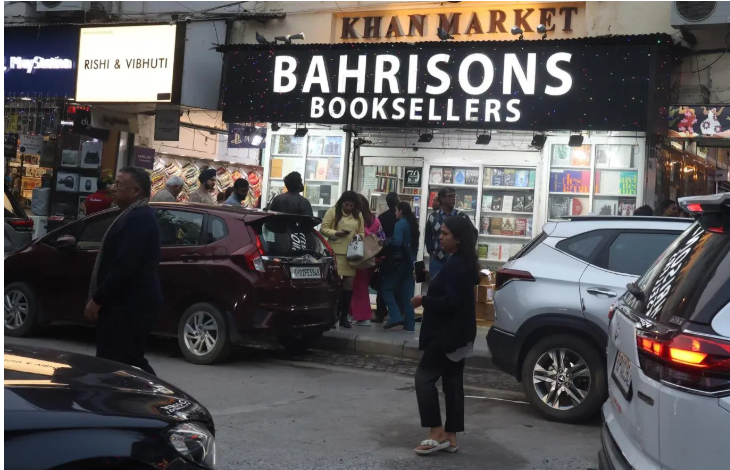India Lifts 36-Year-Old Ban on Salman Rushdie’s The Satanic Verses
New Delhi – In a landmark decision, the Delhi High Court has lifted the 36-year-old ban on importing Salman Rushdie’s controversial novel, The Satanic Verses. This decision comes after the Indian government was unable to provide the original 1988 notification that had imposed the ban, sparking significant debate on censorship and freedom of expression.
12/25/20243 min read


What Is The Satanic Verses? 🖋️
The Satanic Verses is a novel by Salman Rushdie, first published in 1988. It is a work of fiction that blends elements of magical realism with complex religious and cultural themes. The book stirred widespread controversy for its alleged portrayal of Islamic history and figures, which many Muslims found offensive.
In India, where the Muslim community forms a significant part of the population, the book's release was met with protests. Critics claimed the book hurt religious sentiments, leading to its ban under Section 11 of the Customs Act in 1988.
Why Was the Ban Imposed?
In 1988, the Indian government, led by then-Prime Minister Rajiv Gandhi, became one of the first countries to ban The Satanic Verses. The move was largely seen as an effort to quell growing protests and maintain communal harmony.
The ban prohibited the book's import into India, effectively barring its sale or distribution in the country. However, despite the ban, the official order justifying it was untraceable, raising questions about its legal basis.
Why Is the Ban Lifted Now?
In 2019, an independent petitioner challenged the validity of the ban in the Delhi High Court, arguing that the government had no legal documentation to support it. On December 2024, the court ruled in favor of the petitioner after the government failed to provide the original notification imposing the ban.
Key Ruling by the Delhi High Court:
The court stated that in the absence of the official notification, the ban could not be upheld.
Justice Pratibha Singh, who presided over the case, emphasized that proper documentation is essential for imposing any form of censorship.
The ruling now allows the import and sale of The Satanic Verses in India.
What Does This Mean for India?
The decision to lift the ban has several implications:
1. Freedom of Expression Gains Ground
This ruling is seen as a victory for free speech advocates who argue that bans on books, films, and art stifle creativity and critical thinking.
2. Cultural Sensitivities Remain a Concern
While many hail the decision, some religious groups have expressed disappointment, fearing that the book's availability could reignite tensions.
3. A Precedent for Future Cases
The court's decision highlights the need for transparency and accountability in imposing bans, potentially paving the way for challenges to other forms of censorship in India.
Why Was The Satanic Verses So Controversial?
The Satanic Verses faced backlash worldwide, not just in India. The controversy stemmed from:
Its perceived critique of Islamic history and theology.
Allegations of blasphemy that led to protests, bans, and even violence in several countries.
A global fatwa issued by Iran’s Ayatollah Khomeini in 1989, calling for Rushdie’s death, which forced the author into hiding for many years.
Impact of the Ban Lift on Indian Society
Booksellers and Publishers
With the ban lifted, bookstores and online platforms in India can legally sell The Satanic Verses. It remains to be seen how the public will respond to its availability after decades of restriction.
Religious and Political Groups
The lifting of the ban has divided opinions. While some celebrate the decision as a step toward greater freedom, others have warned that the book could once again spark unrest.
Frequently Searched Keywords Explained for Beginners
"Satanic Verses India": Refers to the book's history and legal status in India, where it was banned in 1988 but is now legal to import and sell.
"Satanic Verses Ban": Discusses the restrictions imposed on the book due to its controversial content.
"Satanic Verses Banned in India": Indicates the specific ban on the book in India, which has now been lifted by the Delhi High Court.
"Satanic Verses in Hindi": While the book has never been officially translated into Hindi, the lifting of the ban may encourage translations into Indian languages.
"Satanic Verses Ban Lifted": Refers to the recent court ruling allowing the import and sale of the book in India.
A Historic Moment for Literature in India
The lifting of the ban on The Satanic Verses marks a turning point in India’s approach to censorship and artistic freedom. While the book remains controversial, its availability symbolizes the resilience of free expression in a diverse and democratic society.
Stay tuned to GeoNewsDaily for more updates on this developing story and its implications for freedom of speech in India.